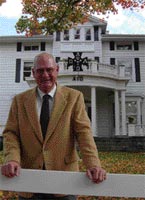Willson: Where in the World Are We Going?
John Willson
Hillsdale College

Where
in the World Are We Going?
Sunday Morning Session
The Philadelphia Society National Meeting
Philadelphia, April 2, 2006
I begin with a parable. A sixty-two year old blond
haired grandmother forgot to take off cross-stitch scissors as she approached an
airline check-point. She was patted down. She was virtually
strip-searched. They took her scissors away. She looked at me for
help. I failed her. In 1966 President Lyndon Johnson announced what he
said was his “overriding rule”: “Our foreign policy must always be an
extension of our domestic policy. Our safest guide to what we do abroad is
what we do at home.” It will come as no surprise to members of this
society that foreign and domestic policies always reflect each other.
It is a truism.
Progressives usually reason from the domestic to the foreign, but that doesn’t
mean that the truism doesn’t work the other way around. LBJ wanted to make a
Great Society in Vietnam and prove it by what he called “coonskins on the
wall;” proofs of “good things” we were doing to create democracy. We
became as great a destabilizing force in Southeast Asia as the communists.
Walter Lippmann warned us in 1938 that the “dominant dogma of the age” was
that government has the ability to make us happy. If government can make
us happy, then using our military might to make other people happy should not,
it seems, make Americans less happy. I’m afraid, however, and we have
ample evidence of this in the history of every policy adventure since the
Philippines: that those who think that “regime change” is a proper and valid
goal of foreign policy almost always think that our republic is made of
play-dough. Social engineering abroad leads inevitably to social
engineering at home, and vice-versa.
The opposite of “conservative” is not “liberal” or “progressive,”
The opposite of conservative is “ideologue.” I’m with Forrest
McDonald on this point. America’s great achievement, our only real
achievement, is limited government. The march away from limited government
is led by the band playing the dominant dogma of the age, conducted by
ideologues, who used to call themselves liberals but most recently
insist that they are Republicans and conservatives.
I had a good talk with David Hackett Fischer (a great historian) after he had
read a piece I wrote called “World War II: the Great Liberal War”. My
argument was that although Robert Taft may have been a little gloomy when he
said that going into World War II guaranteed the demise of the Constitution, he
wasn’t far off. David argued that World War II “unleashed the full
potential of American democracy.” I replied that the way we fought the
war wounded the American constitutional republic nearly unto death. Both
of us may have been right.
Our foreign policy failures since World War II—and there have been many
(except for one)—are almost all due to sound principles being transformed into
ideology, sometimes intentionally, sometimes by circumstances. If one
reads NSC-68 carefully, a document that bound us to one folly after another for
twenty-six years before it was declassified shortly after the last helicopter
left Saigon; or if one reads carefully Prospect for America, a frightening book
funded by the Rockefeller family that sent one ideologue after another into top
policy positions from Kennedy to Bush II, one would understand why Peggy Noonan
and my wife get strip-searched at airports. Ben Franklin, whose
contributions to our republic I sometimes quibble with, said famously that
“They that can give up essential liberty to obtain a little temporary safety
deserve neither liberty nor safety.”
National Security Strategy 2002, widely acclaimed (and criticized) as a
statement of conservative foreign policy principles, in fact stands directly in
the tradition of NSC-68 and Prospect for America. NSS2002 is supposedly
innovative because it warns that the United States “will exercise our right of
self-defense by the first use of armed force.” In fact the earlier
documents implied this same doctrine, and all three spend far greater amounts of
ink putting together comprehensive political, economic, social, and educational
plans to democratize the
world. This used to be called “Liberal Internationalism.” Now
that it’s associated with Republicans and conservatives, it must mean that we
have all bought into the Dominant Dogma of the Age. George Kennan was the
greatest of our foreign policy conservatives. Thank God that the
ideologues didn’t transform his measured, humble, prudent “containment”
into nuclear war, although they came close. Such limited government as we have
left is probably due to him, or to his way of thinking. If we any longer wish to
maintain a constitutional republic, what is our proper “role in the world?”
As small a role as possible.
